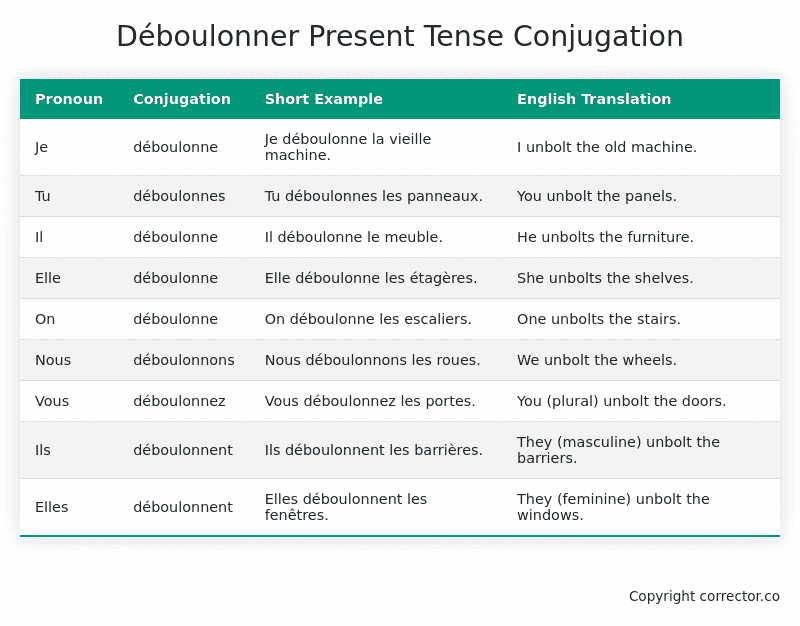Le Present (Present Tense) Conjugation of the French Verb déboulonner
Introduction to the verb déboulonner
The English translation of the French verb déboulonner is “to unbolt” or “to remove a bolt.” The infinitive form of déboulonner is pronounced as “dey-boo-lon-ay.”
Déboulonner originates from the combination of the prefix “dé-” which denotes removal or separation, and the word “boulon” meaning “bolt.” It is most often used in everyday French to describe the action of taking out or loosening a bolt or fastener.
Examples:
- J’ai déboulonné la vieille étagère pour la remplacer. (I unbolted the old shelf to replace it.)
- Ils ont déboulonné les roues du vélo pour les réparer. (They removed the bike’s wheels to repair them.)
- Elle a déboulonné les sièges de sa voiture pour créer plus d’espace. (She unbolted the seats in her car to create more space.)
Déboulonner – About the French Present Tense
To take a deep dive into all the French tenses then see our article on Mastering French Tense Conjugation.
Common Everyday Usage Patterns For Le Present
Interactions with Other Tenses
Table of the Present Tense Conjugation of déboulonner
| Pronoun | Conjugation | Short Example | English Translation |
|---|---|---|---|
| Je | déboulonne | Je déboulonne la vieille machine. | I unbolt the old machine. |
| Tu | déboulonnes | Tu déboulonnes les panneaux. | You unbolt the panels. |
| Il | déboulonne | Il déboulonne le meuble. | He unbolts the furniture. |
| Elle | déboulonne | Elle déboulonne les étagères. | She unbolts the shelves. |
| On | déboulonne | On déboulonne les escaliers. | One unbolts the stairs. |
| Nous | déboulonnons | Nous déboulonnons les roues. | We unbolt the wheels. |
| Vous | déboulonnez | Vous déboulonnez les portes. | You (plural) unbolt the doors. |
| Ils | déboulonnent | Ils déboulonnent les barrières. | They (masculine) unbolt the barriers. |
| Elles | déboulonnent | Elles déboulonnent les fenêtres. | They (feminine) unbolt the windows. |
Other Conjugations for Déboulonner.
Le Present (Present Tense) Conjugation of the French Verb déboulonner (You’re reading it right now!)
Imparfait (Imperfect) Tense Conjugation of the French Verb déboulonner
Passé Simple (Simple Past) Tense Conjugation of the French Verb déboulonner
Passé Composé (Present Perfect) Tense Conjugation of the French Verb déboulonner
Futur Simple (Simple Future) Tense Conjugation of the French Verb déboulonner
Futur Proche (Near Future) Tense Conjugation of the French Verb déboulonner
Plus-que-parfait (Pluperfect) Tense Conjugation of the French Verb déboulonner
Passé Antérieur (Past Anterior) Tense Conjugation of the French Verb déboulonner
Futur Antérieur (Future Anterior) Tense Conjugation of the French Verb déboulonner
Subjonctif Présent (Subjunctive Present) Tense Conjugation of the French Verb déboulonner
Subjonctif Passé (Subjunctive Past) Tense Conjugation of the French Verb déboulonner
Subjonctif Imparfait (Subjunctive Imperfect) Tense Conjugation of the French Verb déboulonner
Conditionnel Présent (Conditional Present) Tense Conjugation of the French Verb déboulonner
Conditionnel Passé (Conditional Past) Tense Conjugation of the French Verb déboulonner
Conditionnel Passé II (Conditional Past II) Tense Conjugation of the French Verb déboulonner
L’impératif Présent (Imperative Present) Tense Conjugation of the French Verb déboulonner
L’impératif Passé (Imperative Past) Tense Conjugation of the French Verb déboulonner
L’infinitif Présent (Infinitive Present) Tense Conjugation of the French Verb déboulonner
L’infinitif Passé (Infinitive Past) Tense Conjugation of the French Verb déboulonner
Le Participe Présent (Present Participle) Tense Conjugation of the French Verb déboulonner
Le Participe Passé (Past Participle) Tense Conjugation of the French Verb déboulonner
Struggling with French verbs or the language in general? Why not use our free French Grammar Checker – no registration required!
Get a FREE Download Study Sheet of this Conjugation 🔥
Simply right click the image below, click “save image” and get your free reference for the déboulonner present tense conjugation!

I hope you enjoyed this article on the verb déboulonner. Still in a learning mood? Check out another TOTALLY random French verb present conjugation!


